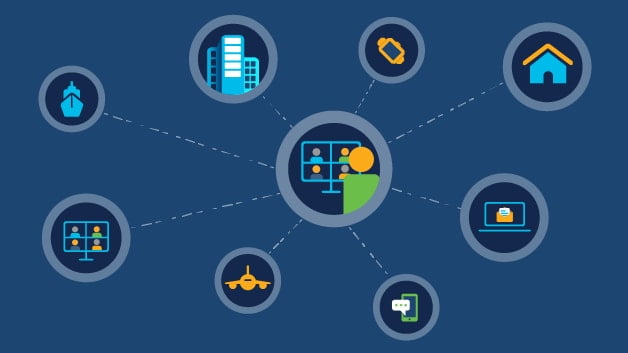

Remote workers have higher anxiety levels about security and privacy than other types of employees, according to an international study released Tuesday by a cybersecurity software maker.
In a survey by F-Secure of 7,200 people from nine countries, more than two-thirds (67 percent) of remote workers acknowledged they worried about security and privacy, even when nothing was wrong, compared to 58 percent of other respondents.
Remote workers also feel more overwhelmed trying to manage security across all their connected devices compared to others (63 percent to 59 percent).
They have a more fearful view of the internet, too, with 65 percent of remote workers saying it was becoming a dangerous place, compared to only 48 percent of other respondents.
Wearables and connected home appliances are also worrisome to remote workers. More than seven out of 10 of them (71 percent) expressed anxiety about the potential of those devices to violate their privacy, compared to 64 percent of others.
In fact, privacy has become such a concern for remote workers that 63 percent of them revealed to researchers that they’d altered how they use the internet over it, compared to 48 percent of other respondents.
Longing for IT Security
Employees working at home may miss that IT department at work that handled most security problems at the office, maintained John Grohol, a psychologist in Newburyport, Mass. who specializes in online behavior.
“When at home, a worker may not feel as comfortable in their home network’s security, including the security of every single device residing on that network,” he told TechNewsWorld.
“With the internet of things, we’ve seen how insecure various connected devices at home can be,” he continued. “Just one of those insecure devices can compromise the integrity and security of an entire home network.”
Remote workers have to cope with the removal of the trappings of security found in modern corporate environments, too.
“When people have to badge in, have security guards, or the other obvious things to protect the security of a building, they will feel more secure,” explained John Bambenek, a principle threat hunter at Netenrich, an IT and digital security operations company in San Jose, Calif.
“Remote workers have to contend not only with the feeling of separation from the office, but also with separation from corporate security,” he told TechNewsWorld
Separation Anxiety
Adam Gavish, co-founder and CEO of DoControl, a provider of security services for SaaS applications in New York City, maintained that working remotely makes an employee feel more exposed.
“There’s almost a false sense of security from being in a physical office, so being removed from that environment only elevates an individual’s anxiety when it comes to security and privacy,” he told TechNewsWorld.
“It’s normal human behavior to feel more vulnerable as a result of being physically separated and isolated from the rest of the workforce,” he added.
In addition to feeling separation anxiety, remote workers may suddenly find themselves saddled with additional security duties to add to that anxiety.
“People who recently switched to online work might also have a sudden influx of new accounts to manage — VPNs, video conferencing, chat apps, document collaboration, and so on,” explained Paul Bischoff, a privacy advocate at Comparitech, a reviews, advice and information website for consumer security products.
“That means they are responsible for creating and managing a lot of new passwords, as most companies haven’t adopted single-sign-on or password-less systems yet,” he continued.
“They’re also responsible for downloading and installing the correct software with the correct settings, as the default settings of apps are often not the most private nor secure,” he added.
Those additional duties may contribute to security anxiety, but they can contribute to security awareness, too.
“If you’re required to keep your own network up and running for working at home, you will naturally begin to be more aware of how you can be attacked while online,” explained Chris Hauk, consumer privacy champion at Pixel Privacy, a privacy and security website.
“You will likely be required to perform your own system and app updates,” he told TechNewsWorld. “That means curious types may begin to read more about security and privacy, making them more aware than they would have been while working from the office.”
Isolation Builds Awareness
Security anxiety for remote workers grows with time, maintained Erich Kron, the security awareness advocate at KnowBe4, a security awareness training provider in Clearwater, Fla.
“Over time, the idea that the working from home arrangement is temporary is going to fade,” he told TechNewsWorld. “Once the individual realizes that this may be a long-term change, the responsibility for the privacy and security of company data and assets may begin to assert itself on the employee.”
“It can be far easier for a person to feel out of touch for a short amount of time than for longer periods,” he continued. “Over time, the feeling of isolation replaces that of being a part of a team and with that, the feeling that more responsibility is yours to bear can increase.”
“It’s like in a scary movie, when there’s a group of people, they look inward to the group and feel some sense of safety,” he said. “However, if they are alone, they are looking around in every direction whenever there is a strange sound because they no longer have the benefit of the safety found in a group.”
“Many people may not even realize the sense of isolation has built up, but it does impact how they see the things around them,” Kron observed. “Without a team to rely on, they will naturally feel like the responsibility is theirs.
“For those who are aware of the importance of security, they will naturally take it upon themselves to be more security-aware,” he added.
Reducing Anxiety
What can companies do to reduce anxiety in their remote workers?
“Make sure that they give users tools to protect themselves, even at home, and that such protection is visible but not obstructive to their work,” recommended Bambenek.
“Security teams should work with HR and people leaders to scale up education initiatives on secure remote behaviors and existing security controls to mitigate remote worker anxiety,” added Jasmine Henry, field security director for JupiterOne, a Morrisville, N.C.-based provider of cyber asset management and governance solutions.
“Security teams should educate their remote workers on existing controls that have been scaled to remote work settings, including VPN, device management, endpoint protection and data loss prevention,” she told TechNewsWorld.
Henry added that security departments at organizations “should also clearly and continuously educate their remote teams on what is exactly expected for remote workers to be responsible and follow acceptable use policies.”
One thing companies shouldn’t do to reduce remote worker anxiety, however, is blindly invest in technology.
“The first thing we see companies do is buy more technology. But if you’re purchasing new technology in an organization that hasn’t quite grasped the concept of risk management, and probably doesn’t have enough skilled tech personnel, you’re just complicating your situation further,” said James Graham, VP of marketing at RiskLens — a risk management company in Spokane, Wash.
“New technology calls for a validated model for risk management that can assess your situation in the language of business — dollars and cents — so you can make some rational, defensible decisions,” he told TechNewsWorld.
[“source=technewsworld”]





